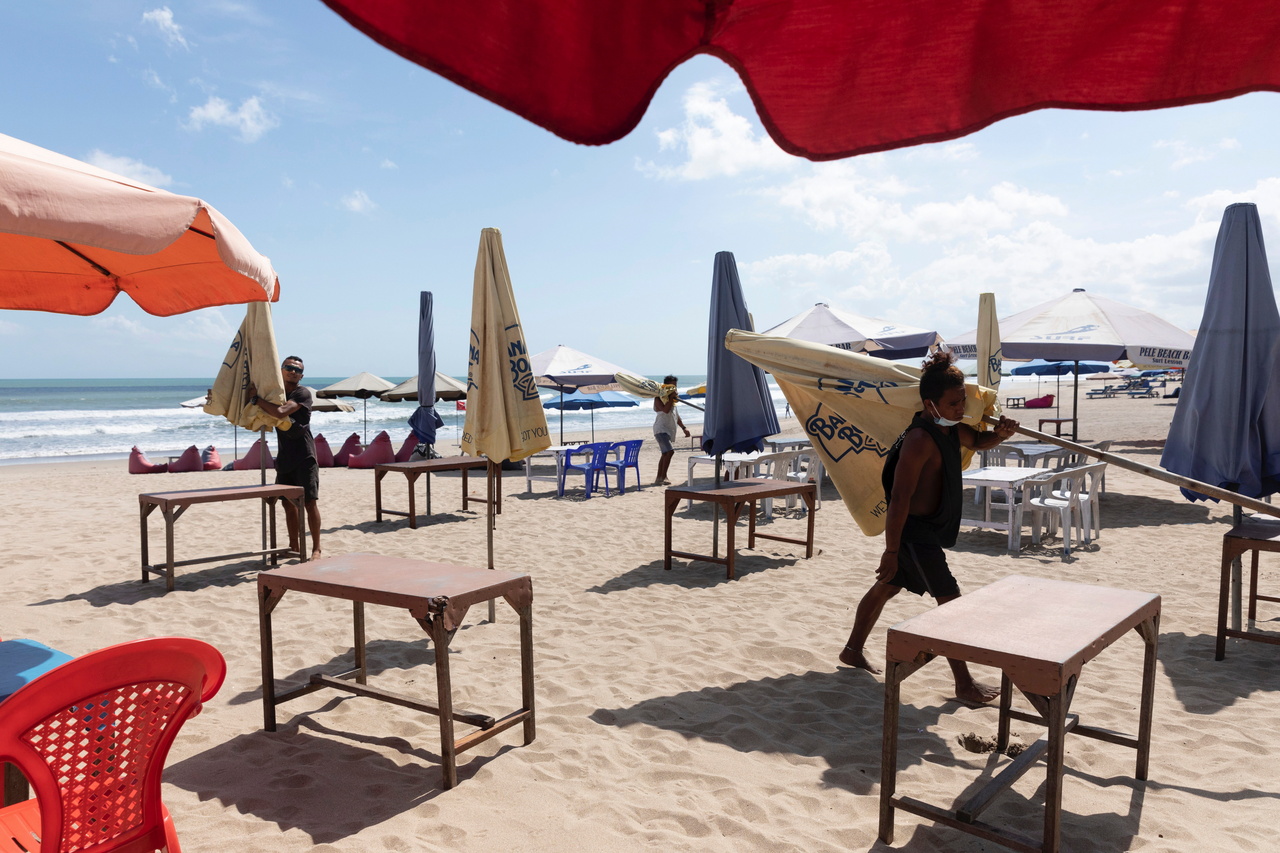Bali in second lockdown misery just as reopening was in sight
Sign up now: Get insights on Asia's fast-moving developments

Occupancy at hotels across Bali averaged just 20 per cent in June.
PHOTO: REUTERS
DENPASAR, INDONESIA - Before Bali entered its second lockdown this month, Ms Diaz, 32, floor manager at Watercress Cafe, was just about muddling through.
On a normal day last month, her restaurant, on the main thoroughfare between Canggu and Seminyak, would chalk up sales to a largely foreign clientele of about 140 people either dining in or getting food deliveries.
And while that volume was a fraction of what the bistro would normally do at this time of year, the revenue was enough to schedule 20 to 30 staff. But on a recent weekday, she had just nine on duty, and the frustration of 15 months of on-again-off-again shutdowns was beginning to show.
"It's so depressing," Ms Diaz, who would only give her nickname, told the Straits Times. "Things were just starting to get better."
Thanks to an ambitious vaccination programme, where roughly 70 per cent of the island's adults have at least been partially vaccinated against Covid-19, Bali seemed to be on a path to reopening.
An uptick of domestic tourism and initiatives to work from the holiday island had yielded a small but steady recovery relative to the dark days at this time last year.
On the last Friday of June, the island notched up more than 60 aircraft arrivals compared with just four in the same period a year earlier, according to airport data.
A check of resorts in Seminyak and Uluwatu revealed occupancy rates in some cases averaged roughly 75 per cent in June. Occupancy across the island averaged 20 per cent in June, according to the Bali Hotel Association.
As recently as last month, Indonesia's Tourism Minister, Mr Sandiaga Uno, said plans to host small groups of foreign holiday makers in designated locations were near completion. Plans were even in the works to offer a "vaccination tourism programme" where foreign tourists could get doses of the Covid-19 vaccine - for a fee - during their stay.
But since the July 2 lockdown, which expanded nearly nationwide on Wednesday (July 7) as new cases and deaths surged, occupancy has broadly halved in these same hotels as travellers scrambled to get flights home.
The number of new cases in Indonesia passed 31,000 on Tuesday. Officials have warned that daily cases may reach 50,000. At 728, the number of deaths from Covid-19 on Tuesday is seven times that less than a month ago.
"This is a very difficult time for everyone," said Mr Ricky Putra, general manager at Six Senses resort in Uluwatu, where occupancy dropped by more than half to 10 per cent this week.
"We support the government's action. We certainly hope the rate of vaccinations increases so we can reopen."
Mr Sandiaga told reporters on Monday that plans to reopen to foreign tourism are "still continuing" but the decision to proceed will hinge on suppressing local daily cases to below 100, with some 70 per cent to 80 per cent of the island's roughly 4 million people fully vaccinated.
"The work-from-Bali activity, vaccine tourism in Bali, has been temporarily postponed," Mr Sandiaga said, during a media briefing over Zoom.
At stake is the prospect of reviving billions of tourism dollars. In 2019, the island raked in US$18 billion (S$24.2 billion) in spending, with $US8 billion coming from overseas visitors who tend to stay longer and spend more than Indonesians.
Frustration is bubbling over on suspicion that Indonesia's spike in cases followed lacklustre efforts to curb the yearly exodus out of Indonesia's cities to home villages and then back again at the end of post-Ramadan Idul Fitri holidays.
"Most people here feel the government could have done more to shut down movement during Idul Fitri," said Mr Blake Johnson, founder of the popular Coffee Cartel cafes in Seminyak and Canggu.
On a regular day before the pandemic, the cafe would accommodate 400 people a day. Now it barely covers wages with take-out orders.
"They didn't stop people moving around during Idul Fitri. Now we're all suffering," said Mr Blake.
At Devira Massage, Ms Wayan Sumiati, 43, who has leased the thatched roof spa behind Watercress for 15 years, doesn't know how her family will be able to pay the fees the owner will demand when the time comes to renew their contract in three months' time.
Before the pandemic hit, she had a roster of a dozen therapists catering to roughly 15 to 20 clients a day. Now there is one therapist and the spa can go as long as four days without a client.
"I pray to God that there will be more tourists," she said.
Winding down a once-bustling street in Seminyak, Mr Gede Prima, 45, records a video of the near-desolation for a documentary he is putting together with his friends.
A tattoo artist with an extensive Australian clientele, Mr Gede has a map of Indonesia inked on his neck and throat and the word "hopeless" inscribed onto his knuckles.
Though the latter tattoo predates the pandemic, Mr Gede says his predicament is nevertheless dire. With his tattoo parlour long since shuttered, some clients have been sending him money.
"If it weren't for my Aussie clients, I would lose my home," Mr Gede told ST.
"I just want Covid to end so I can have my Aussies back."


